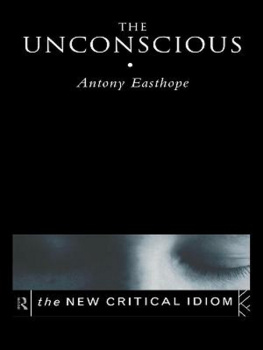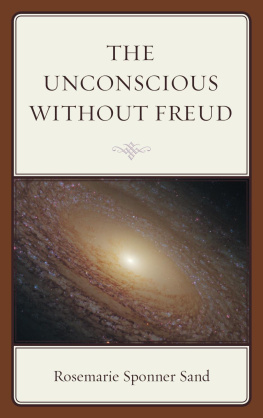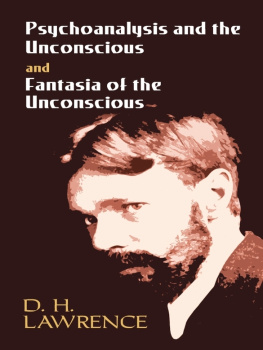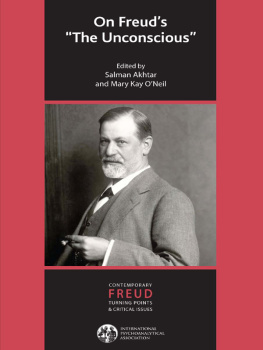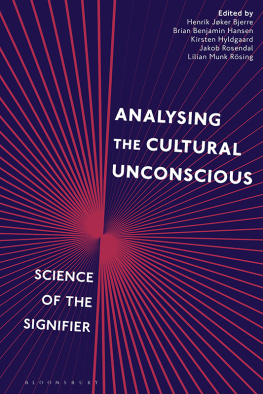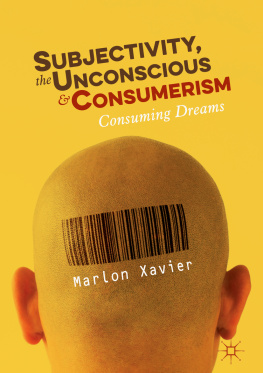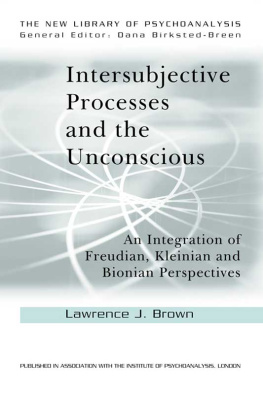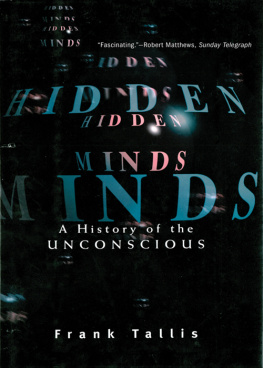THE UNCONSCIOUS
Does the unconscious exist and if so what does it do to us? Antony Easthope looks for answers not deep inside but in what people say and do every day without considering it. Lucid, accessible and often funny, the book shows the reality of the unconscious with a stunning variety of examples: from jokes and rugby songs to Hamlet, Hitchcocks Psycho and the life and death of Princess Di.
The idea of the unconscious chang s the way we think about identity, sexuality, history, art and literature. The conclusion draws on psychoanalysis to discuss Stalins Russia, Nazism and the Final Solution.
Antony Easthope is Professor of English and Cultural Studies at Manchester Metropolitan University and author of Englishness and National Culture (Routledge 1999).
THE NEW CRITICAL IDIOM
SERIES EDITOR: JOHN DRAKAKIS, UNIVERSITY OF STIRLING
The New Critical Idiom is an invaluable series of introductory guides to todays critical terminology. Each book:
- provides a handy, explanatory guide to the use (and abuse) of the term
- offers an original and distinctive overview by a leading literary and cultural critic
- relates the term to the larger field of cultural representation.
With a strong emphasis on clarity, lively debate and the widest possible breadth of examples, The New Critical Idiom is an indispensable approach to key topics in literary studies.
- Other books in the series.
Colonialism/Post colonialism by Ania Loomba
Gothic by Fred Botting
Historicism by Paul Hamilton
Humanism by Tony Davies
Ideology by David Hawkes
Literature by Peter Widdowson
Metre, Rhythm and Verse by Philip Hobsbaum
Myth by Laurence Coupe
Pastoral by Terry Gifford
Romanticism by Aidan Day
Sexuality by Joseph Bristow
Stylistics by Richard Bradford
THE UNCONSCIOUS
Antony Easthope
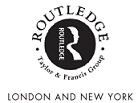
First published 1999
by Routledge
11 New Fetter Lane, London EC4P 4EE
Simultaneously published in the USA and Canada
by Routledge
29 West 35th Street, New York, NY 10001
Routledge is an imprint of the Taylor & Francis Group
This edition published in the Taylor & Francis e-Library, 2003.
1999 Antony Easthope
The right of Antony Easthope to be identified as the Author
of this Work has been asserted by him in accordance with
the Copyright, Designs and Patents Act 1988
All rights reserved. No part of this book may be reprinted or reproduced or utilised in any form or by any electronic, mechanical, or other means, now known or hereafter invented, including photocopying and recording, or in any information storage or retrieval system, without permission in writing from the publishers.
British Library Cataloguing in Publication Data
A catalogue record for this book is available from the British Library.
Library of Congress Cataloguing in Publication Data
A catalogue record for this book has been requested.
ISBN 0-203-19765-8 Master e-book ISBN
ISBN 0-203-26561-0 (Adobe eReader Format)
ISBN 0-415-19208-0 (hbk)
ISBN 0-415-19209-9 (pbk)
For Diane
SERIESEDITORSPREFACE
The New Critical Idiom is a series of introductory books which seeks to extend the lexicon of literary terms, in order to address the radical changes which have taken place in the study of literature during the last decades of the twentieth century. The aim is to provide clear, well-illustrated accounts of the full range of terminology currently in use, and to evolve histories of its changing usage.
The current state of the discipline of literary studies is one where there is considerable debate concerning basic questions of terminology. This involves, among other things, the boundaries which distinguish the literary from the non-literary; the position of literature within the larger sphere of culture; the relationship between literatures of different cultures; and questions concerning the relation of literary to other cultural forms within the context of interdisciplinary studies.
It is clear that the field of literary criticism and theory is a dynamic and heterogeneous one. The present need is for individual volumes on terms which combine clarity of exposition with an adventurousness of perspective and a breadth of application. Each volume will contain as part of its apparatus some indication of the direction in which the definition of particular terms is likely to move, as well as expanding the disciplinary boundaries within which some of these terms have been traditionally contained. This will involve some re-situation of terms within the larger field of cultural representation, and will introduce examples from the area of film and the modern media in addition to examples from a variety of literary texts.
PREFACE
Thirty years ago most people with liberal and progressive views believed that a large part of human unhappiness was caused by economic and social conditions. Get rid of poverty and injustice people would be happy. Since then the majority of people throughout the Western world have acquired prosperity and social opportunities they never dreamed of before. Even so, many old forms of unhappiness remain and new ones have developed. Statistics for depression, suicide, alcohol and drug abuse are all a lot higher in Britain now than they were in 1955.
Why does someone keep having the same disastrous relationship with different partners? Why does another repeatedly enter into love affairs enthusiastically only to run from them the moment they look like taking off? Why do so many couples begin passionately in love only to find seven years and two children later that their partner is insufferably boring or irritating or worse? Why does an able, affectionate and intelligent boy from a loving family reach the age of thirteen, get in with the wrong crowd at school and move from truancy to petty crime to hard drugs, breaking his mothers heart along the way?
Forty per cent of children in England go to sleep each night in a home with only one of their natural parents. Poverty still puts a strain on marriages, but its not the only reason parents leave each other. Someone stuck in a violent or bitterly loveless relationship has to get out. But children would almost always prefer parents to stay together if they could. When he was twelve my son had a friend at school; in the afternoon he could go to his mothers, his fathers, or his grannys, but the truth was that none of them wanted him.
I didnt really fancy reading Gordon Burns book Happy LikeMurderers about Fred and Rosemary West, both sexually abused as children, who went on to torture and dismember twelve young women, including some of their own children. In a review Melanie Phillips said the couple were not evil in the metaphysical sense. Rather they were the products of a culture of fractured identities, violence, cruelty, transient relationships and, above all, neglected, abused and unloved children (TLS, 9 October 1998). As I read it the theory of the unconscious has a clear message: try to look after the kids.
We need the concept of the unconscious today because it addresses questions of human happiness and unhappiness which come up

